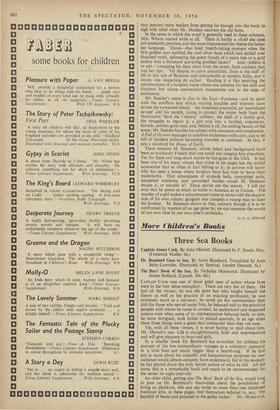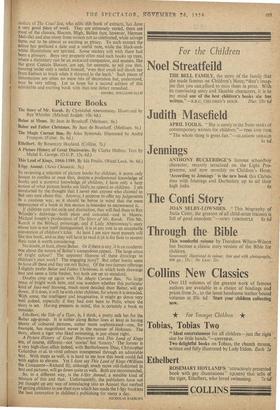11 lore Children's Books
Three Sea Books Captain James Cook. By John Merrett. Illustrated by F. Stocks May. (Frederick Muller. 6s.) Dr. Bombard Goes to Sea. By Alain Bombard. Translated by Joan Selby-Lowndes. Illustrated by Samivel. (Andre Deutsch. 6s.) The Boys' Book of the Sea. By Nicholas Monsarrat. Illustrated by James Holland. (Cassell. 10s. 6d.)
CAPTAIN Coot( was one of those great men of action whose lives were in the best sense exemplary. There are very few of them. He had all the virtues; he was the poor boy who taught himself the theory as well as the practice of an exacting profession; he was extremely exact as a surveyor, he cared (as few commanders then did) for those who served under him, he behaved well to the primitive peoples with whom he came in contact, he understood and respected science even when some of its representatives behaved badly to him, he never intrigued, took bribes or picked quarrels, in an age when, these three things were a good deal commoner than they are now.
Yet, with all these virtues, it is never boring to read about him. Mr. Merrett's new Life is straightforward, brief and unpretentious and will give pleasure to boys and girls. In a smaller book Dr. Bombard has re-written for children his account of his two extraordinary voyages as a voluntary castaway in 'a little boat not much bigger than a hearth-rug.' If he had put in more about his scientific and humanitarian purposes his new audience would almost certainly have understood, but in his modesty he has played down the truly heroic nature of what he did. All the same, this is a remarkable book and much to be recommended for the seven- or eight-year-old. An older child, getting also The Boys' Book of the Sea, would long to pass on Dr. Bombard's discoveries about the possibilities of living on plankton, fish and sea water to more than one distressed boatload who, in these pages, find themselves reduced to, say, 'the handful of beans and potatoes in the galley locker.' Mr. Monsarrat,
author of The Cruel Sea, who edits this book of extracts, has done a very good piece of work. They are extremely varied, there are most of the classics, Slocum, Bligh, Bullen (not, however, Herman Melville) and also many from writers not so celebrated, while salvage turns out to be almost as exciting as piracy. To each extract the editor has prefaced a date and a useful note, while the black-and- white illustratiOns are spirited. Some readers will wish there had been a glossary. Boys very properly often read such books up trees, where a dictionary can be an awkward companion, and seamen, like the great Captain Slocum, are apt, for example, to tell you that, running under only a reefed foresail, 'even that small sail shook her from keelson to truck when it shivered in the leech.' Such pieces of information are often no mere bits of decoration but, understood, may be very telling. Let us hope for a second edition of this 4 admirable and exciting book with that one defect remedied. AMABEL WILLIAMS-ELLIS











































 Previous page
Previous page